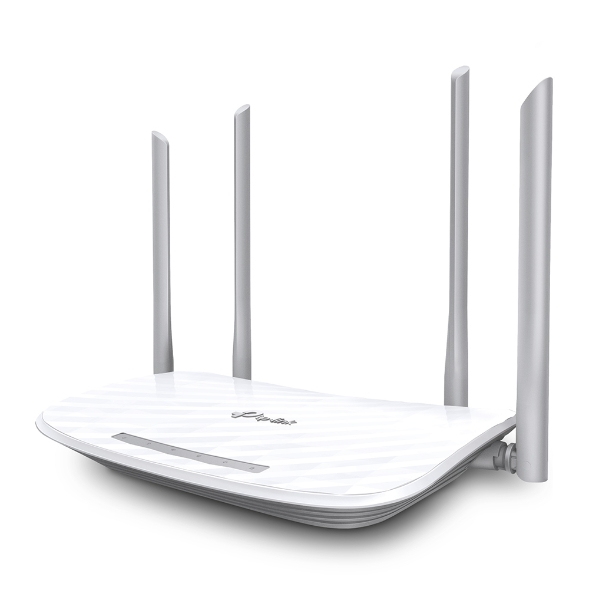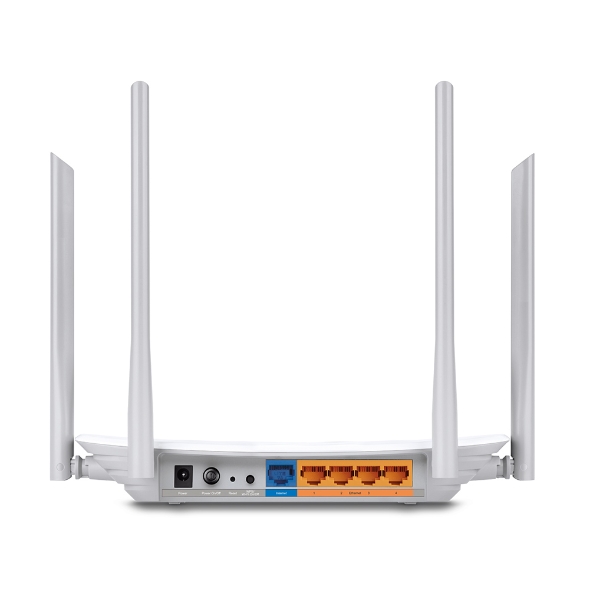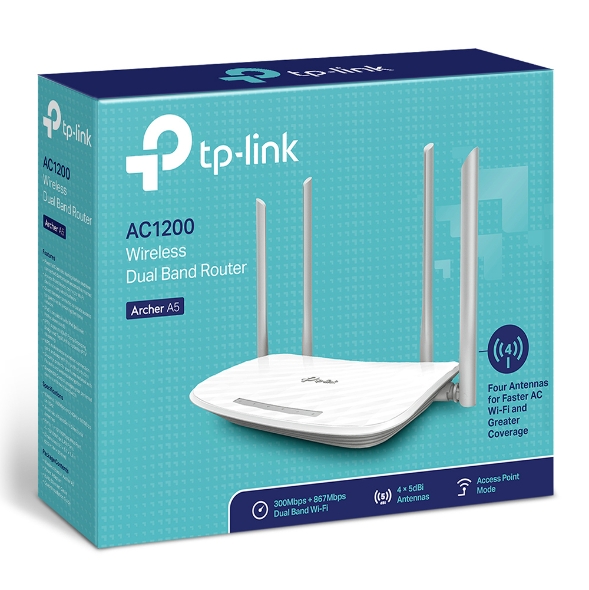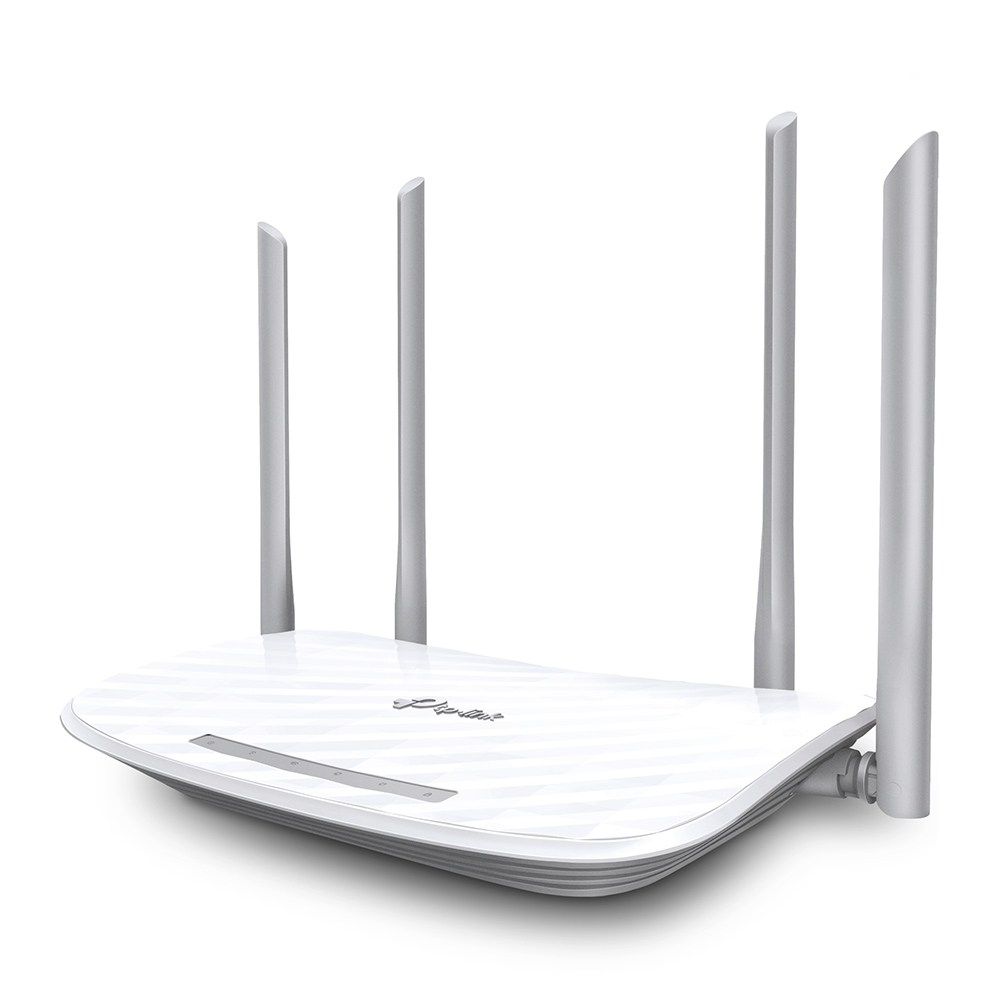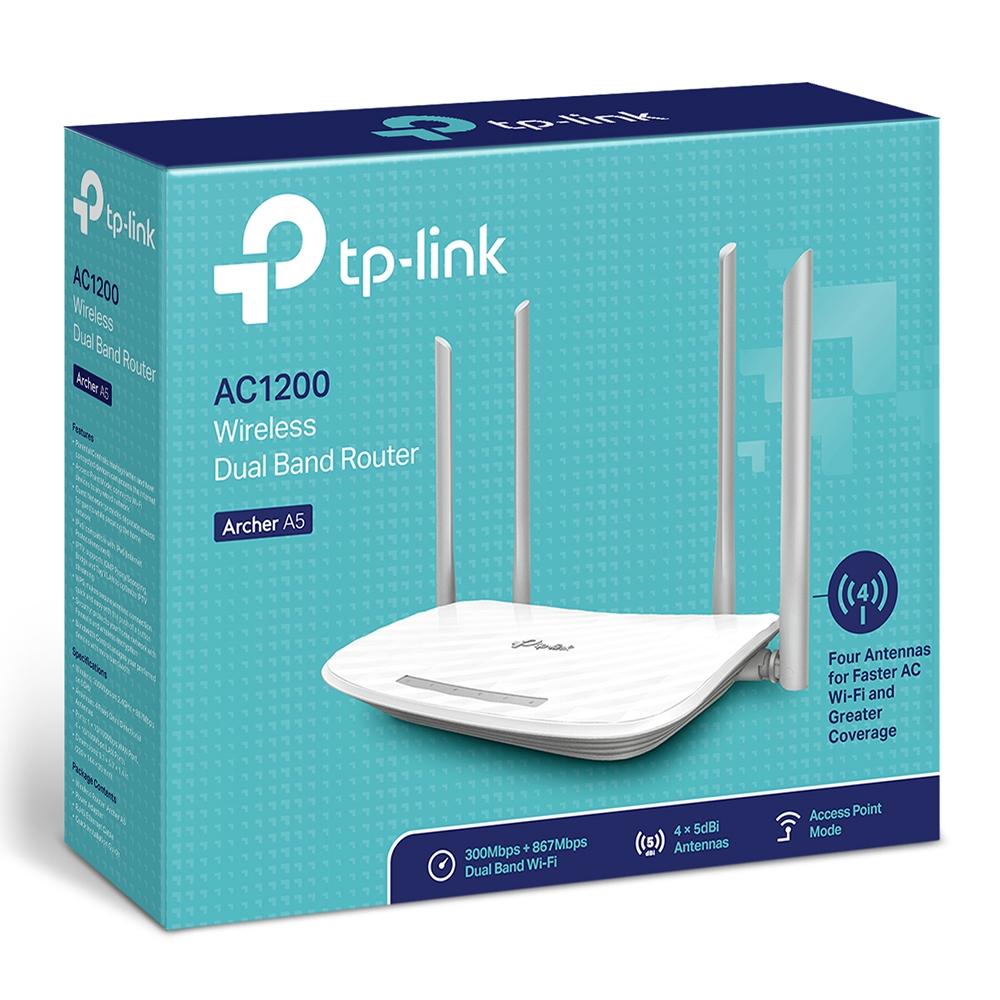AC1200 Wireless Dual Band Router
- Supports 802.11ac standard
- Simultaneous 2.4GHz 300 Mbps and 5GHz 867 Mbps connections for 1200 Mbps of total available bandwidth
- 4 external antennas provide stable wireless connections and optimal coverage
- Easy network management at your fingertips with TP-Link Tether
- Supports IGMP Proxy/Snooping, Bridge and Tag VLAN to optimize IPTV streaming
- Supports Access Point mode to create a new Wi-Fi access point
Strong,
Far-Reaching Wi-Fi
AC1200 Wireless Dual Band Router
Archer A5
High-Speed Dual Band Wi-Fi for Better Connections
The Archer A5 lets your PC or laptop enjoy connections 3x faster than Wireless N with Wireless AC technology.
With 300Mbps over the 2.4GHz band and 867Mbps over the the crystal clear 5GHz band, the Archer A5 is
the superior choice for seamless HD streaming, online gaming and other bandwidth-intensive tasks.
Innovative Antenna Design for Maximum Coverage
Four well-ordered antennas make all of your connections more efficient and stable. Advanced antenna technology increases the receiving sensitivity to enlarge Wi-Fi coverage for your home.
Easy Parental Control
Supervise children and staff with responsible access, controlled by parents or administrators. Use key words to easily set up a black list and limit the level of web access.
Guest Network Access
Allow guests to join your Wi-Fi network, while protecting your privacy. Make sharing easy, maintain security.
Easy Setup and Use
Set up the Archer A5 in minutes thanks to its intuitive web interface and the powerful Tether app. Tether also lets you manage its network settings from any Android or iOS device, including parental controls and access control.
| WI-FI | |
|---|---|
| Standards and Protocols | Wi-Fi 5IEEE 802.11ac/n/a 5 GHzIEEE 802.11n/b/g 2.4 GHz |
| WiFi Speeds | AC12005 GHz: 867 Mbps (802.11ac)2.4 GHz: 300 Mbps (802.11n) |
| WiFi Range | 2 Bedroom Houses 4× Fixed AntennasMultiple antennas form a signal-boosting array to cover more directions and large areas |
| WiFi Capacity | Medium Dual-BandAllocate devices to different bands for optimal performance |
| Working Modes | Router ModeAccess Point Mode |
| BẢO MẬT | |
|---|---|
| Network Security | SPI FirewallAccess ControlIP & MAC BindingApplication Layer Gateway |
| Guest Network | 1× 5 GHz Guest Network1× 2.4 GHz Guest Network |
| WiFi Encryption | WEPWPAWPA2WPA/WPA2-Enterprise (802.1x) |
| HARDWARE | |
|---|---|
| Processor | Single-Core CPU |
| Ethernet Ports | 1× 10/100 Mbps WAN Port4× 10/100 Mbps LAN Ports |
| Buttons | WPS/Wi-Fi ButtonPower On/Off ButtonReset Button |
| Power | 9 V ⎓ 0.85 A |
| SOFTWARE | |
|---|---|
| Protocols | IPv4IPv6 |
| Parental Controls | URL FilteringTime Controls |
| WAN Types | Dynamic IPStatic IPPPPoEPPTPL2TP |
| Quality of Service | QoS by Device |
| NAT Forwarding | Port ForwardingPort TriggeringDMZUPnP |
| IPTV | IGMP ProxyIGMP SnoopingBridgeTag VLAN |
| DHCP | Address ReservationDHCP Client ListServer |
| DDNS | NO-IPDynDNS |
| Management Features | Tether AppWebpageCheck Web Emulator> |
| OTHER | |
|---|---|
| System Requirements | Internet Explorer 11+, Firefox 12.0+, Chrome 20.0+, Safari 4.0+, or other JavaScript-enabled browserCable or DSL Modem (if needed)Subscription with an internet service provider (for internet access) |
| Certifications | FCC, CE, RoHS |
| Environment | Operating Temperature: 0℃~40℃ (32℉ ~104℉)Storage Temperature: -40℃~70℃ (-40℉ ~158℉)Operating Humidity: 10%~90% non-condensingStorage Humidity: 5%~90% non-condensing |
| TEST DATA | |
|---|---|
| WiFi Transmission Power | CE EIRP:<20dBm(2.4GHz)<23dBm(5GHz)FCC:<30dBm(2.4GHz & 5GHz) |
| WiFi Reception Sensitivity | 5GHz:11a 54M: -73dBm11ac VHT20 MCS8: -68dBm11ac VHT40 MCS9: -64dBm11ac VHT80 MCS9: -60dBm2.4GHz:11g 54M: -76dBm11n HT20 MCS7: -74dBm11n HT40 MCS7: -71dBm |
| PHYSICAL | |
|---|---|
| Dimensions (W×D×H) | 9.1 × 5.7 × 1.5 in(229.9 × 144.2 × 36.9 mm) |
| Package Content | Wi-Fi Router Archer A5Power AdapterRJ45 Ethernet CableQuick Installation Guide |
*Maximum wireless signal rates are the physical rates derived from IEEE Standard 802.11 specifications. Actual wireless data throughput and wireless coverage are not guaranteed and will vary as a result of 1) environmental factors, including building materials, physical objects, and obstacles, 2) network conditions, including local interference, volume and density of traffic, product location, network complexity, and network overhead, and 3) client limitations, including rated performance, location, connection, quality, and client condition.
Actual network speed may be limited by the rate of the product's Ethernet WAN or LAN port, the rate supported by the network cable, Internet service provider factors and other environmental conditions.

